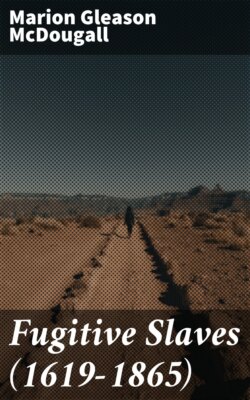Читать книгу Fugitive Slaves (1619-1865) - Marion Gleason McDougall - Страница 11
На сайте Литреса книга снята с продажи.
Fugitive Question in Constitutional Conventions.
ОглавлениеTable of Contents
§ 15. The Fugitive question in the Constitutional Conventions.—While the Northwest Ordinance was passing through Congress, the Philadelphia Convention was framing a new Constitution, and the return of fugitives was again eagerly insisted upon by the slave States. The necessity of some positive stipulation that fugitives should be returned was felt to be even more necessary in a Constitution meant permanently to bind together a free and a slaveholding section. The only debate of which we have a record occurred August 28, 1787. Mr. Butler of North Carolina pressed the point in behalf of the Southern States. To his first proposition, "that fugitive slaves and servants be delivered up like criminals,"51 Mr. Wilson objected; he saw no reason for obliging the state to arrest fugitives at public expense, while Mr. Sherman saw no more propriety in the public seizing and surrendering a slave or servant than a horse.52 Mr. Butler therefore withdrew the proposition. He soon introduced a more particular provision, which was accepted and inserted in the Constitution, as follows:—
"No person held to Service or Labour in one State, under the Laws thereof, escaping into another, shall, in Consequence of any Law or Regulation therein, be discharged from such Service or Labour, but shall be delivered up on Claim of the Party to whom such Service or Labour may be due."53
In the various Constitutional Conventions, there was little discussion upon the matter. The Southern States in general considered the clause sufficient to protect their property. General Charles C. Pinckney, in South Carolina, said: "We have obtained the right to recover our slaves in whatever part of America they may take refuge, which is a right we have not had before. In short, considering all circumstances, we have made the best terms for the security of this species of property it was in our power to make. We would have made better if we could, but on the whole I do not think them bad."54 In North Carolina, Mr. Iredell explained to the Convention that the Northern delegates, owing to their peculiar scruples on the subject of slavery, did not choose the word "slave" to be mentioned; but since the present laws were so prejudicial to the inhabitants of the Southern States, some such clause was necessary.55 In Virginia, Mr. Grayson discussed the provision giving Congress exclusive legislation over ten square miles surrounding the capital. It seemed to him that, unless the ten miles square be considered a State, "persons bound to labor who shall escape thereto will not be given up. For they are only to be delivered up after they shall have escaped into a State."56 This objection, though perfectly good at the time, was later overcome by the adoption by Congress of the laws of Maryland for the regulation of the District of Columbia, whereby it was made slave territory. Mr. Mason did not think the clause provided sufficiently for the protection of their slaves,57 but Mr. Madison urged its adoption, as a better security than anything they then had.58
In the North, there was apparently no discussion upon this article. Everywhere, however, it was thought that without such a clause the Southern States would not consent to the Union, and, in a spirit of compromise, the provision was accepted.
